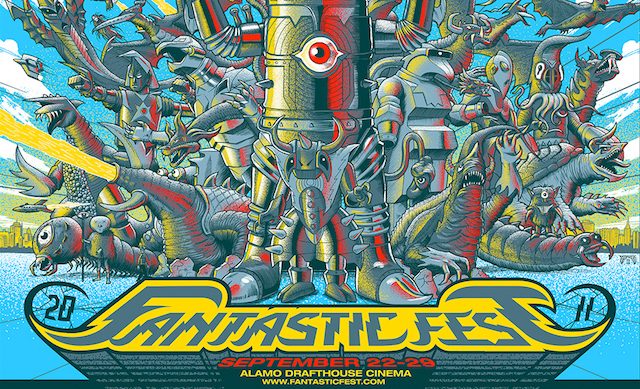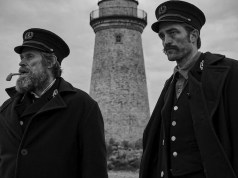
When people ask what sort of movies are shown at Fantastic Fest, the easiest answer is that it’s any movie that can be described as “awesome.” In general terms, that means horror, sci-fi, and fantasy. In practice, Fantastic Fest also includes Asian martial-arts movies, obscene Danish comedies, crime thrillers of various nationalities, and even a wholesome Japanese family flick about a time-traveling samurai.
The festival, held at Austin’s Alamo Drafthouse, was created in 2005 by Drafthouse impresario Tim League and Ain’t It Cool News demigod Harry Knowles. Though I’d been to the Drafthouse many times during South by Southwest, and though SXSW has recently added a small “SXFantastic” section programmed by League, last year was my first experience with the fest itself. For a fan of movies like the ones described above, it’s a paradise full of like-minded film enthusiasts and marked by a laid-back attitude. (SXSW is known for its raucous atmosphere, but Fantastic Fest makes it look like a Passover seder.)
Here’s a quick rundown of everything I saw at this year’s fest (which ended Thursday), in order from best to worst. Some of these will turn up in American theaters eventually; some will make it to DVD; and some, like the guy who says “I’ll be right back” in a slasher movie, will never be heard from again.
“A Boy and His Samurai”
I knew it was possible that something at Fantastic Fest would make me cry, but I thought it would be the curled-up-in-the-fetal-position, rocking-quietly-in-the-corner kind of crying, not the kind where your heart is touched and you feel all warm and nice inside. “A Boy and His Samurai” is by Yoshihiro Nakamura, whose “Golden Slumber” and “Fish Story” are, if anything, even more beloved than this one. It’s the utterly charming and wholesome story of a single mom and her little boy who meet a 19th-century samurai who has inexplicably traveled to the present day. He becomes a friend to the woman and a guardian to the boy. He also becomes a dessert chef — one of several delightfully baffling details the film has to offer. Plot-wise, this is pure formula, a simple retelling of the basic “exotic outsider arrives and makes everyone better” scenario that we’ve seen in everything from “Mary Poppins” to “Elf.” Yet the performances by the boy (Fuku Suzuki), the mom (Rie Tomosaka), and the samurai (Ryo Nishikido) are so thoroughly likable, and the story told with such childlike sweetness, that I dare say it’s impossible not to be won over by the film’s simple pleasures. A-
“Clown”
There is evidently a TV series in Denmark called “Clown” (“Klovn”), starring comedians Frank Hvam and Casper Christensen as loutish fictional versions of themselves, not unlike Larry David in “Curb Your Enthusiasm.” If the long-awaited (in Denmark, anyway) big-screen version of “Clown” is any indication, the TV show must be astonishingly dirty, hilarious, and genuinely taboo-busting. In the film, Frank and Casper take a weekend away from their women in order to do drugs and have sex with other women. But Frank’s girlfriend’s 11-year-old nephew gets dragged along, too, complicating things in ways that you cannot even imagine, far beyond the shtick you’d expect it to lead to. The style of humor is appealing as a combination of several things: the selfish, awful main characters like “It’s Always Sunny in Philadelphia,” the incredibly awkward situations like “Curb Your Enthusiasm,” the debauchery and nonsense of “The Hangover.” There are a couple sight gags in Clown that would almost certainly have to be removed for the film to play in the United States without theater owners being arrested. But being arrested might be worth it, because the film is damn funny. A-
“You’re Next”
The hit of Fantastic Fest was this puckish horror comedy about a dysfunctional family whose vacation house comes under attack by masked assailants. Bloody, witty, and truly crowd-pleasing. My complete review is here. B+
“Underwater Love”
It’s possible that I have never seen a movie as bizarre as this one. Not surprisingly, it’s from Japan, part of the genre of low-budget soft-core erotica known as “pink films.” This particular pink film is also a musical and a fairy tale, being the story of a young woman who befriends a turtle-like folkloric creature called a kappa who is the reincarnation of a boy she knew in high school. She is engaged to be married to a bland businessman, but she falls for the kappa. Most of the movie is a dizzying array of camp, slapstick, and magical realism, all gorgeously photographed by cinematographer Christopher Doyle. Director Shinji Imaoka sets a tone of wholesome, simple-minded corniness — and then, occasionally, delivers an explicit sex scene, including one involving the kappa. Then it’s back to the whimsy! Pink films are supposed to have sex scenes, and Imaoka’s investors demanded that this one have musical numbers, but I assume the decision to have everything else be Disney-esque princess-and-the-frog merriment was Imaoka’s. What a wise choice it was, too, as much of the film’s baffling charm is in the way it veers so abruptly from G-rated to R-rated and back again. It’s sweet and frequently hilarious in its own weird way. B+
“Sleep Tight”
A suspenseful and entertaining stalker movie with some ingenious variations, shrewd direction, and a killer lead performance. My complete review is here. B+
“Headhunters”
With “Headhunters,” a whip-smart and stylishly entertaining entry from Norway, you get three movies in one: first it’s a heist caper; then it’s a domestic drama; and finally it’s a thrilling chase film. Our hero, Roger Brown (Aksel Hennie), is a pale, short man who compensates for his Napoleon complex by having a hot wife and living outrageously beyond his means. He makes a good living as a headhunter (i.e., a corporate recruiter), and to supplement it he’s also an accomplished art thief. When he meets a ruggedly handsome potential client named Clas Greve (Nikolaj Coster-Waldau, from “Game of Thrones”) and feels his masculinity threatened, Roger is unnerved. When he learns that Clas owns a very valuable painting, Roger sees his chance to assert his dominance by stealing it. Ah, but it turns out Clas is not the kind of man you want to steal from. One of the many pleasures in Morten Tyldum’s film (which was based on a novel) is the way he makes us root for Roger Brown even though Roger Brown is a con man and a thief. Seeing him wriggle out of danger in various ingenious ways is exhilarating and often comical. Like many multi-threaded caper films, the plot of this one ends up having some holes in it; the screening I attended was followed by several conversations on the order of “But wait, why did he…?” and “But wait, where did the…?” Those conversations were enthusiastic, though: Whether it makes complete sense or not, “Headhunters” is a fun ride. B+
“Kill Me Please”
From Belgium comes this dark comedy, shot in grainy black-and-white, about a luxurious hotel in the mountains where wealthy people go to be compassionately and sensitively killed. It is a euthanasia clinic. Part of the film’s creative team worked on “Man Bites Dog,” the 1992 mockumentary/satire that has the rare distinction of earning an NC-17 rating solely for violence. Other members of the “Kill Me Please” team are from “A Town Called Panic” (the movie, not the town), the crazy-brained children’s film from 2009. You can see influences from both types of humor at play in “Kill Me Please”: sometimes restrained, sometimes farcical, eventually bloody. The finale gets very dark indeed, more so than the rest of the movie, but it’s a fitting conclusion to the smart, twisted story. B
“Juan of the Dead”
This film might never be shown in public again, but I’m writing about it anyway for a couple of reasons. One, it’s a zombie movie from Cuba and it’s called “Juan of the Dead,” and that’s too perfect to be ignored. Two, it’s the first Cuban zombie movie ever made, and possibly the first Cuban horror movie of any kind. Three, the first-time filmmaker, Alejandro Brugues, applies the familiar zombie metaphors to his country’s particular situation, and in so doing lambastes communism and the Castro regime. Just as George Romero’s zombie flicks were commentaries on modern America, Brugues’ is uniquely Cuban. When “Juan of the Dead” played at Fantastic Fest, it had not yet been approved by the Cuban government’s official censorship committee. I can’t imagine it ever would be approved, unless the committee members are so dense they see it only as a horror comedy and miss all the barely concealed subtext. In short, the film could be politically important, perhaps even revolutionary. For that reason, I wish the bulk of its humor weren’t so corny and feeble, and that Brugues didn’t resort to cheap jokes as often as he does. I mean, if we’re going to the wall to defend his rights as an artist, it would be nice if he were a better artist. But on the splattery side of things, he does a terrific job with his limited resources, and he delivers a fast-paced, energetic account of the Cuban zombie apocalypse that’s easily worth watching at midnight sometime — assuming Castro doesn’t order all the copies destroyed, that is. B-
“Two Eyes Staring”
Though it’s not fair to reduce a movie to a simple equation, I will do just that with “Two Eyes Staring” and tell you it’s “The Sixth Sense” meets “Don’t Be Afraid of the Dark” — OR IS IT?? This effectively creepy thriller from the Netherlands is about a 9-year-old girl named Lisa (Isabelle Stokkel, terrific) who has moved with her parents to the marvelous old mansion her mother grew up in. Lisa’s ambitious and career-minded mom (Hadewych Minis) is distant, so Lisa is daddy’s little girl. You should see her eyes light up when he walks in the room! A 9-year-old needs more companionship than that, though, and Lisa has a history of creating imaginary friends. She “meets” one in the cellar of the old house, a young girl named Karen (Charlotte Arnoldy) who is fictional, dead, alive, or some combination of those. Further intrigue is added when Lisa finds her mother’s childhood diary, the contents of which may shed light on Mom’s current disposition. The film offers a couple of satisfying surprises but is otherwise nothing you haven’t seen before. It plays the familiar notes very well, though. And in case it never makes it to American theaters, Charlize Theron has already optioned the remake rights. B-
“The Devil’s Business”
Up-and-coming British horror maven Sean Hogan wrote and directed this slow-burning thriller about two hit men, one smooth and experienced (Billy Clarke), the other new and easily rattled (Jack Gordon), who are assigned by their ruthless boss (Harry Miller) to kill a business associate (Jonathan Hansler). Much of the film has the assassins talking as they wait for their target to arrive, learning more about the guy and why their boss wants him dead. Hogan got some attention earlier this year for his contribution to the nasty horror anthology “Little Deaths” which played at FrightFest and South by Southwest. (If you saw it, his was the first segment, the one about the religious couple taking in a homeless girl.) The most notable thing about “The Devil’s Business” is that it feels like it should have been another 30-minute short. Its small, “Twilight Zone”-ish story just doesn’t lend itself to feature length. That said, it’s still only 75 minutes, offers some eerie thrills, and has a mesmerizing lead performance by Billy Clarke. (Note: “The devil’s business” is my new euphemism for pooping.) C+
“Retreat”
More than anything, I think “Retreat” will be a useful calling card for its first-time writer/director, Carl Tibbetts. Potential collaborators or employers may watch it and be impressed by the promise he shows, the way he handles an eerie premise and works with a tiny cast. Give this guy something truly great to work with and he could indeed be truly great. All of which is a roundabout way of saying that “Retreat” itself is not particularly good. It’s overly melodramatic, and not nearly as tense as it wants to be — not nearly as tense as it needs to be, actually, to work as a paranoid thriller. The setup is perfectly workable, though. Cillian Murphy and Thandie Newton play a couple with a troubled marriage who visit a quaint cottage on a tiny island for a quiet getaway. Nobody else is around; even the caretaker is on the mainland, reachable only by CB radio. So it is surprising when another man (played by Jamie Bell) comes stumbling up to the cottage, bleeding profusely and jabbering about a viral outbreak back in civilization. But is he telling the truth? Is he crazy? Is he part of a conspiracy? If there’s a virus, why isn’t Steven Soderbergh guiding an all-star cast in a race to cure it? One of the indications that the film doesn’t quite work is that it’s 90 minutes long but feels like two hours. By the time things really heat up, it’s too late to get re-invested in the story. C
“The Human Centipede 2”
In a perverse twist worthy of a Fantastic Fest horror movie, the worst thing I saw at Fantastic Fest was the opening-night selection, this sequel to the notorious gross-out flick from two years ago. My complete review is here. D
— Film.com




